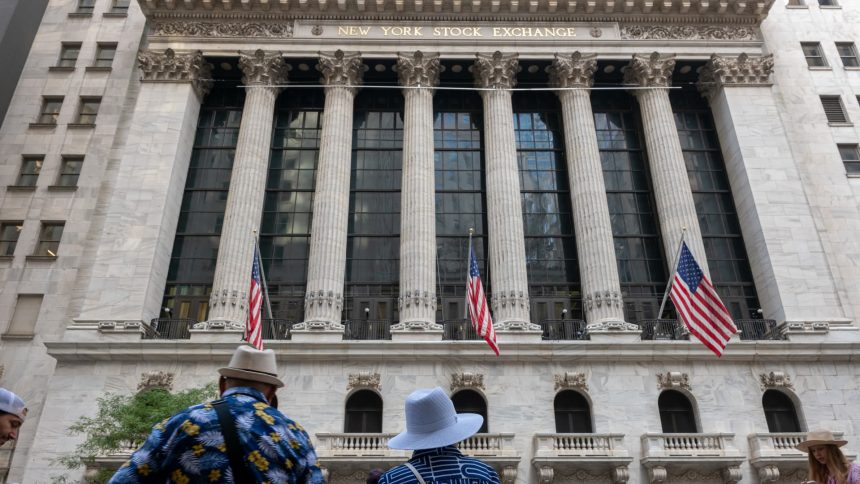The first two trading weeks of September have whiplashed investors. Last week was strong as stocks staged a comeback following favorable updates on inflation and a slew of companies at various analyst conferences. September is known as the worst month of the year for stocks. While all three Wall Street benchmarks are still slightly lower for the month, last week’s rally pushed the S & P Short Range Oscillator back up toward an overbought market condition. The wildcards this week are the Federal Reserve’s latest meeting and earnings from economic-sensitive stocks. The S & P 500 rebounded 4% this past week, almost clawing back all of the prior week’s horrible decline. It was a similar story for the Dow , which gained 2.6%, and the Nasdaq , which advanced nearly 6% last week. In the prior week, they lost nearly 3% and 5.8%, respectively. Jim Cramer said Friday , “I like what we’re doing because we stuck with the big caps,” especially Nvidia. He added that the Club portfolio is well-positioned going forward. Shares of Nvidia surged 16% last week. The stock was nearly back to levels seen before its big slide following last month’s earnings , which failed to live up to sky-high expectations. Investors rode the rally that was sparked by CEO Jensen Huang’s bullish comments at the Goldman Sachs Communacopia + Technology Conference and during a CNBC interview following a White House meeting on artificial intelligence energy infrastructure. Jim also said Friday that shares of Nvidia are now getting something of a “do-over,” with investor confidence in the company’s ability to keep delivering strong results not only bolstered by Huang but also by Oracle ‘s double-dose of outlook hikes. A major buyer of Nvidia chips, Oracle last Monday beat on quarterly results and raised guidance . Then two days later, at an analyst meeting coinciding with the Oracle CloudWorld conference in Las Vegas, the database software and cloud giant boosted its fiscal 2026 revenue outlook . Perhaps even more telling of just how early in the AI data center refresh cycle we really are, Oracle sees fiscal 2029 revenue exceeding $104 billion. Clearly, there is massive pent-up demand for the kind of AI-solutions that simply wouldn’t be possible without Nvidia, and that shows no signs of letting up. Lisa Su, CEO of Club name Advanced Micro Devices , also spoke at last week’s Goldman Sachs conference, providing largely in line updates on the state of the business. The MI325 is still expected to launch in the fourth quarter. She still thinks a $400 billion AI-accelerated total addressable market (TAM) by 2027 is reasonable. Su also said, “We are at the start of a multiyear AI PC cycle.” She added that while 2024 is only the start of the cycle, “it’s the most significant innovation that’s come to the PC market in definitely the last 10-plus years.” That certainly plays right into our investment thesis for Best Buy where people go to learn, interact, and buy personal computers. Apple unveiled last week its AI-enabled iPhone 16 at its ” Glowtime ” product launch event. Jim took issue with the mixed commentary around the new device, citing the totality of the capabilities of the new iPhone 16 from artificial intelligence to longer battery life to better cameras. “All of these things will be incremental, just enough to eventually convince millions” over time to upgrade their devices, he added. No portfolio companies delivered earnings last week (and none will report this week, either). However, several companies did provide updates, including Honeywell . CEO Vimal Kapur at a Morgan Stanley’s conference hinted at what may be next — and Starbucks , with new CEO Brian Niccol publishing an open letter discussing the four key areas he’s focused on in his first 100 days. Wells Fargo reiterated guidance at the Barclays Global Financial Services Conference. But fellow Club bank holding Morgan Stanley said mergers and acquisitions and initial public offerings revenue will be below trendline through the rest of the year, before ramping up in 2025. On the economic front, last Wednesday brought the release of the August consumer price index . On a year-over-year basis, the headline reading was a tick below expectations, while the core index was basically in line with estimates. While we didn’t love the slight uptick we saw in the rate of shelter cost inflation and the release initially saw the market selloff, investors ultimately shrugged it off. Perhaps, they took comfort in the idea that we’re still going to get an interest rate cut at the Fed’s meeting on Sept. 17-18. Fed watch The Fed is the big market event this week. A cut is a foregone conclusion. The only question is how big of a cut are we going to get. The market odds, according to the CME FedWatch Tool , are 50/50 — split right down the middle on whether central bank policymakers will cut a quarter percentage point (25 basis points) or a half point (50 basis points). The current range for the fed funds overnight bank lending rate, which is what everyone is referring to when talking about cutting interest rates, is 5.25% to 5.5%. Whether the Fed goes 25 or 50 basis points, we think it’s important that central bank chief Jerome Powell speaks at his post-meeting press conference Wednesday afternoon with confidence and assures investors that he and his colleagues will remain agile and continue to adjust policy as needed based on further economic updates. Though data dependence remains crucial, we think the market will also welcome any signs that the Fed is willing to factor in a bit more forecasting than we’ve seen in the past given that inflation has indeed been trending lower, as desired, and we know there is a lag between policy updates and when that change is felt in the economy. During the first day of the Fed’s meeting Tuesday, the August retail sales and August industrial production and capacity utilization reports are out. Retail sales is a big one because it provides information on how consumers are faring and where they’re allocating their spending. That also gives us some idea of what to expect when companies start to report third quarter earnings in the coming weeks. Private consumption drives roughly two-thirds of the U.S. economy, so a resilient consumer is key to avoiding a recession — or at the very least, a hard economic landing. Industrial production and capacity utilization data will provide a look into the state of the manufacturing, mining, and the electric and gas utilities industries. August housing starts and building permits results are out Wednesday morning, just hours before the Fed announces its interest rate decision. August existing home sales are out Thursday. The cost of shelter has been a major issue keeping inflation higher for longer. Remember, we saw a slight uptick in the rate of shelter cost inflation, year-over-year, in the August CPI report. So, we’ll be monitoring the housing supply situation as that’s going to be key to breaking the back of shelter cost inflation. Earnings In the absence of Club names, there are a couple of major companies’ earnings to watch this week, including FedEx and Lennar . They’re out after Thursday’s closing bell. Results from delivery giant FexEx will provide a look into the state of both business and consumer activity given its wide reach and multiple touchpoints in various industries and across various demographics and geographies. As one of the largest homebuilders in America, neck-and-neck with D.R. Horton , Lennar can provide deep insight into the state of the housing market and hopefully provide us with some thoughts on where affordability goes from here. Affordability has been a major issue pressuring U.S. consumers. With supply being the key to increasing affordability, it will be important to listen to what management says on the conference call about what they’re seeing and how they’re thinking about new projects given the Fed is about to start cutting rates. Doug Yearley, CEO of homebuilder Toll Brothers , told CNBC last week “If we have three [Fed] cuts in the fall … we should have a 30-year fixed, no-point mortgage in the 5s, and look out. … “The market should take off.” That prediction played into last week’s continued purchasing of Home Depot shares. Here is our bottom line from last Wednesday’s trade alert : “If Yearley is correct, then it won’t be too long until mortgage rates are at a sweet spot where housing turnover really starts to pick up. We want to be building our Home Depot position before this happens, which is why we started the position [on Sept. 4].” Week ahead Tuesday, Sept. 17 8:30 a.m. ET: Retail Sales 8:30 a.m. ET: Industrial Production & Capacity Utilization Wednesday, Sept. 18 8:30 a.m. ET: Housing Starts & Building Permits 2 p.m. ET: Fed rate decision Before the bell: General Mills (GIS) After the bell: Steelcase (SCS) Thursday, Sept. 19 8:30 a.m. ET: Initial Jobless Claims 10 a.m. ET: Existing Home Sales Before the bell: Darden Restaurants (DRI), FactSet (FDS), Cracker Barrel (CBRL) After the bell: FedEx (FDX), Lennar (LEN) (See here for a full list of the stocks in Jim Cramer’s Charitable Trust.) As a subscriber to the CNBC Investing Club with Jim Cramer, you will receive a trade alert before Jim makes a trade. Jim waits 45 minutes after sending a trade alert before buying or selling a stock in his charitable trust’s portfolio. If Jim has talked about a stock on CNBC TV, he waits 72 hours after issuing the trade alert before executing the trade. THE ABOVE INVESTING CLUB INFORMATION IS SUBJECT TO OUR TERMS AND CONDITIONS AND PRIVACY POLICY , TOGETHER WITH OUR DISCLAIMER . NO FIDUCIARY OBLIGATION OR DUTY EXISTS, OR IS CREATED, BY VIRTUE OF YOUR RECEIPT OF ANY INFORMATION PROVIDED IN CONNECTION WITH THE INVESTING CLUB. NO SPECIFIC OUTCOME OR PROFIT IS GUARANTEED.
The first two trading weeks of September have whiplashed investors.
Read the full article here
News Room




